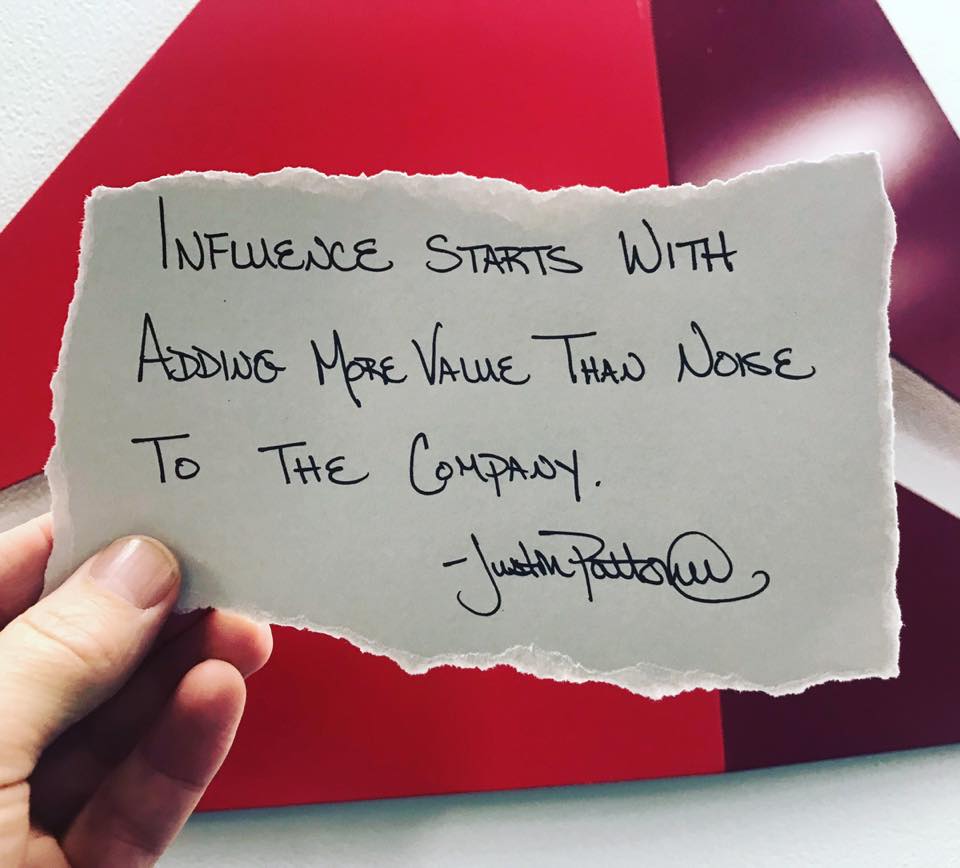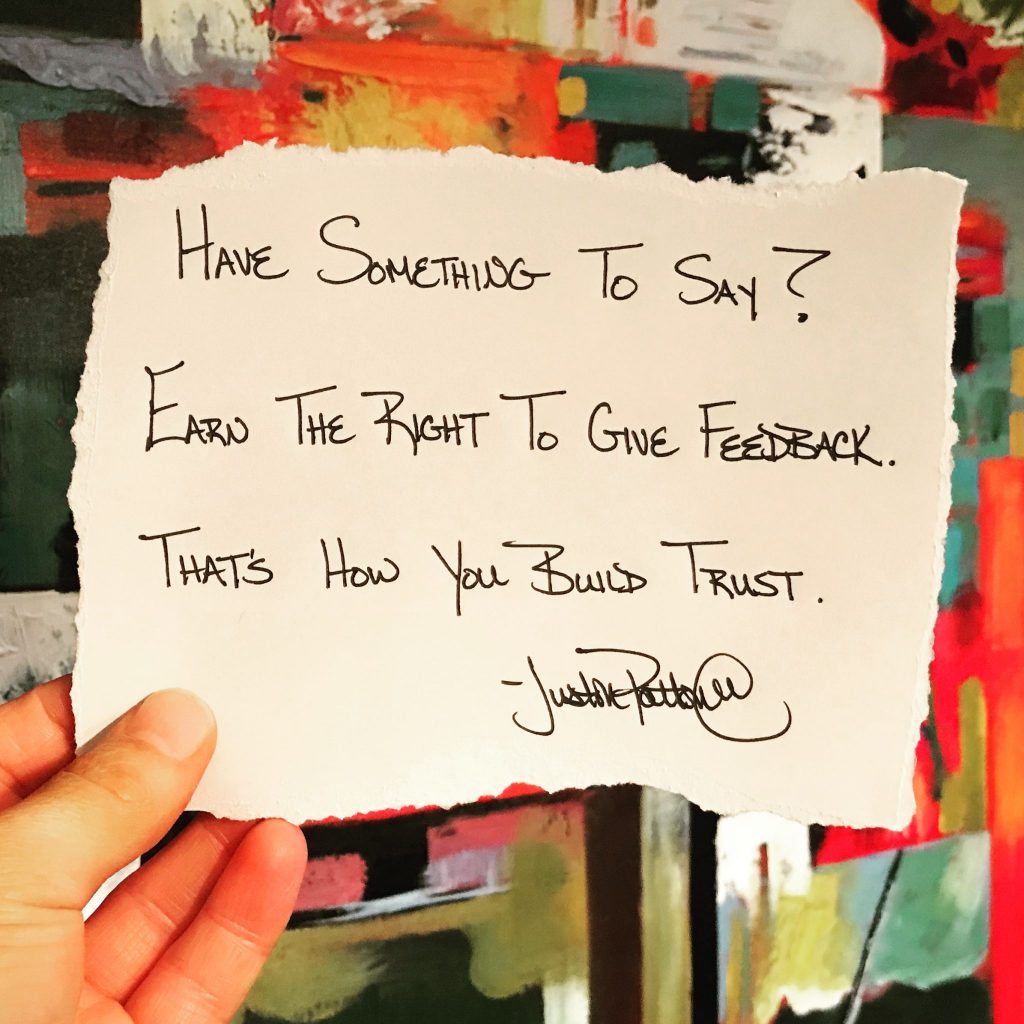Your influence is directly tied to the amount of value you bring to the organization. If you want to play bigger and lead better than you must be intentional about being an influencer at work.
Here are five secrets that no one shares or talks about, but they could be holding you back from the influence you could have.

SECRET #1: ADD MORE VALUE THAN NOISE
The first, fundamental step in creating influence is producing kick-ass work that adds value to your team and the organization. If your work is not making your team look good and your boss’s job easier then you are holding yourself back and you are not as valuable as you might think you are.
Other ways to demonstrate value are by saying yes when opportunities present themselves, expanding the team’s knowledge on industry trends and insights, living the organization’s values, connecting people who could benefit from knowing each other, and focusing on solutions over problems.
You will know you are creating more noise than value when your boss is spending more time managing your behavior, your work, or your relationship with colleagues than on their day-to-day tasks. If this is happening, you must take immediate accountability for your part, make some different choices, and earn quick-wins. Only then can you start to create stronger influence.
QUESTION TO ASK YOURSELF:
How can I add more value to my team and manager?

SECRET #2: PUT THE TEAM BEFORE YOURSELF
Once you start producing great results, you have a responsibility to put just as much effort and intentionality on building quality relationships throughout the organization.
Pat Summit is one of the winningest coaches in college basketball history. In her book, Reach for the Summit, she explains why success requires you to “put the team before yourself.” She talks about high performers and how their competitive nature and egos can often get in the way. She states that “teamwork does not come naturally” but “no organization will succeed without teamwork.” She highlights that, “one selfish player can undo it all.” Your job is to never be that player.
Influence happens when people buy into you and the relationship they have with you. Building authentic relationship that people buy into requires you to zoom out from your perspective and self-interest, create win-win outcomes, be socially responsible to what is best for the team and the organization, and focus on how you get results.
All leaders want team players! A supervisor might keep a corporate athlete on the team who isn’t a good team player for awhile, but the moment their behavior becomes a liability for them or the organization, that athlete will find themselves looking for a different team.
Results and relationship are both important. Influencers, however, understand that you get great results through people.
QUESTION TO ASK YOURSELF:
What would I do differently if I put the relationship before the result?

SECRET #3: MOVE THE CONVERSATION FORWARD
We all know about the boy who cried, “Wolf!” He talked so much that he ended up saying a lot of nothing. He eroded his credibility so much that when it came time to say something meaningful no one listened or believed him.
One of the core lessons I teach my clients around cultivating stronger presence and influence is only speak when you can move the conversation forward. Forward momentum can sound like summarizing or identifying the core problem or concern so everyone gets on the same page, providing an additional perspective that has not already been communicated, or acknowledging others’ perspective and asking a question for further clarity. Forward momentum is not speaking to prove yourself to others in the room or to demonstrate how brilliant you are.
It is easy to be the center of attention, but it takes discernment and high levels of emotional intelligence to sit back, listen to what is not being said, and only talk when you feel you can move the conversation forward. You can be the voice of reason and forward-movement, or you can constantly be the counter argument. One choice fosters executive presence and influence, while the other says a lot of nothing.
QUESTION TO ASK YOURSELF:
Is what I’m about to share going to move the conversation forward?

SECRET #4: PLAY THE GAME IF YOU WANT TO CHANGE IT
I coached a client who was frustrated with how executive leaders were leading the organization and, as a result, he was cynical in how he showed up every day. I realized half-way through our conversation that he was so focused on changing the organization when he was not in a position or had the influence to even do so. I asked if I could give him some feedback based on what I was hearing. He said, “Yes.” I said, “You’re so busy trying to change the game when you are not even willing to play it.” That was an aha! moment for him.
Playing the game requires you to show up authentically, invest the necessary time it takes to build relationships and credibility, demonstrate that your voice and perspective adds value, and navigate corporate politics strategically. You erode your influence, and often rub people the wrong way, when you put more energy in trying to change things instead of earning the right to do it.
QUESTION TO ASK YOURSELF:
What would I do differently if I was being strategic in how I played the game?

SECRET #5: EARN THE RIGHT TO GIVE FEEDBACK
I recently spoke in Lynchburg, Virginia where a group of leaders expressed interest in creating a culture of feedback. They wanted my opinion on best practices for how to create that transformation across their organization. I told them that we do not just inherit the right to give people feedback because we say it is one of our values or we put beautiful marketing signs on the wall.
Great relationships are built on trust and you always listen deeper and respond kinder when someone you trust gives you feedback. Therefore, people in the organization must earn the right to give feedback and always be clear about the intent on why they are offering it.
Your voice and presence matters; however, just because you have something to say doesn’t mean it always needs to be heard in the timing you think is best.
QUESTION TO ASK YOURSELF:
Have I earned enough trust with this individual to give this feedback or would it be better coming from someone else?

